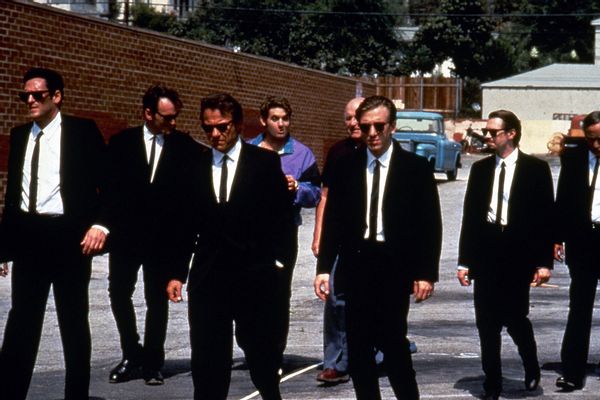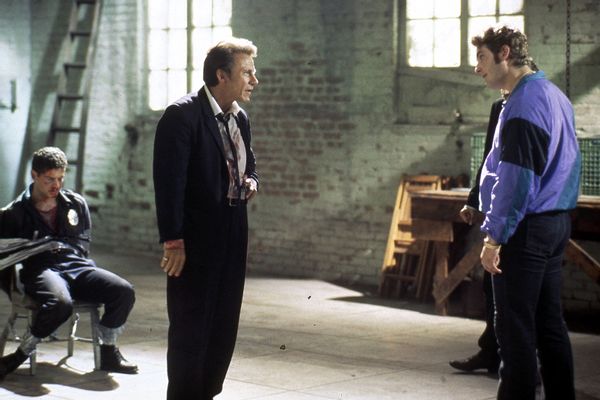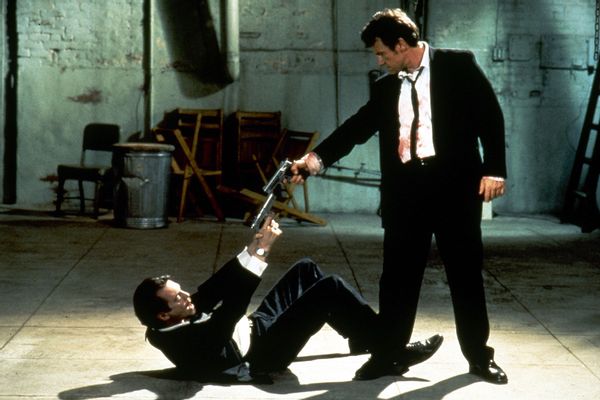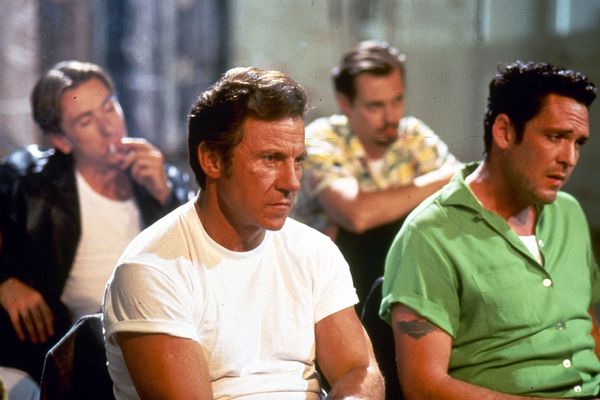
Over a black screen we hear a voice say, "Let me tell you what 'Like A Virgin's' about. It's a song about a girl who digs a guy with a big dick. The entire song is a metaphor for big dicks."
"Reservoir Dogs" represents a changeover in power as the Baby boom generation's vise-grip on the culture starts to give way to the burgeoning Generation X.
And just like that a revolution was sparked. The voice belongs to Mr. Brown, a member of a gang of jewel thieves, portrayed by writer-director-costar Quentin Tarantino. The movie is "Reservoir Dogs," a booby-trapped heist-gone-wrong postmortem released 30 years ago that turned out to be an adrenaline shot to the heart of the American Independent film movement. Before "Dogs," beginning with John Cassavetes' "Shadows" in 1959, independent American movies were viewed as scrappy, stitched-together artistic expressions that posed no real threat to the 800-pound gorilla that was the Hollywood studio system. The fact that "regional authenticity" was stitched into these movies' DNA was seen more as a liability than an asset. And whenever an indie movie managed to crack the mainstream ("Sweet Sweetback's Baadasssss Song," "Pink Flamingos," "The Return of the Seacaucus Seven") they were viewed as anomalies.
That all changed with "Reservoir Dogs." Tarantino decided to look to the recent past — particularly the discarded detritus of the 1970s — in order to pave a way for the future. "Reservoir Dogs" used the outline of a jewel-heist-gone-horribly-wrong story in order to get at what it was really all about: talk. The movie is about the babbling brook of obsessive conversations over the things that really matter – pop culture – and how they can reveal one's humanity (or, lack thereof).
This is on full display in the movie's opening circular sequence as the Dogs share their opinions on the work of Madonna. They are about to pull off a major crime but, at the moment, the most important thing to them is which era of Madonna's work was her best. ("I used to like her early stuff — "Borderline." When she got off on that "Papa Don't Preach" phase, I tuned out!") At one point, co-ringleader Nice Guy Eddie (Chris Penn) asks if anyone else has been listening to K-Billy's Super Sounds of the '70s. Songs like Little Tony DeFranco and the DeFranco Family's "Heartbeat – It's a Love Beat" and "The Night the Lights Went Out in Georgia" get mentioned and dissected. (It turns out that Nice Guy didn't realize that Vicki Lawrence was the one who shot Andy. He thought it was the cheating wife.) All this crosstalk added up to a new world vision where everything old is new again.

So, what is the point of Tarantino using forgotten minor hits from the early '70s to populate his new-style, old-fashioned genre heist movie? There are a couple of factors at play.
First of all, "Reservoir Dogs" represents a changeover in power as the Baby boom generation's vise-grip on the culture starts to give way to the burgeoning Generation X. The previous year had seen the release of Richard Linklater's seminal Gen-X non-narrative triumph "Slacker." Now, with "Dogs," it looked as if the children of the Boomers were stepping out and letting their voices be heard. For the longest time it looked as if the gatekeeping Boomers were embarrassed by the 1970s and all that it encompassed – Nixon, disco, the energy crisis, Punk, the fall of Saigon, bell-bottoms. They much preferred to move headlong into the nihilism of the go-go '80s. Just as depicted in "Boogie Nights" (another movie drenched in '70s details), the changeover from the free-spirited days of analogue to the calculating harshness of video could almost be a stand-in for Gen-X's feeling of dislocation as the creature comforts of their youth gives way to career uncertainty and distrust in institutions.
[Tarantino] stages a scene of taboo-smashing violence only to turn it into a pop reverie.
Another thing that is occurring is the reclaiming and repurposing of one's youth. Just as the Movie Brats of the New Hollywood era (Spielberg, Scorsese, Lucas) retooled the serials, TV shows, and studio movies that shaped their sensibilities, the latch-key kids of the '70s were doing the same. They not only grew up on '70s classics like "The Godfather" (1972), "Taxi Driver" (1976), and "Star Wars" (1977), but also gorged on reruns of classic serials and TV shows like "Leave it to Beaver," "The Honeymooners," and "Green Acres." It was a witch's brew of pop culture.
But Tarantino went a little deeper. He not only revered the stalwarts of the New Hollywood, but he also held in equal esteem grindhouse renegades like Jack Hill, John Carpenter, and Tobe Hooper. As the New Hollywood gave way to the all-climax-all-the-time blockbuster '80s, the Gen-X kids saw the calcification of American movies. They turned into one, continuous blockbuster. The thrill was gone. So by going back to their youth, the Gen-X filmmakers were looking to do nothing less than reenergize American movies. They wanted to make blockbusters, too. They wanted to make them with a cutting edge.

The most significant aspect of the "Reservoir Dogs" soundtrack is the fact that it even had one.
There are a few other notable needle drops throughout the movie. Following the bravura opening-credit sequence, members of the gang start to reassemble at a warehouse, including the overcaffeinated Mr. Pink (Steve Buscemi), who insists there is a "rat" in the gang. When Mr. Blonde shows up with a tied-up cop in his trunk, the three men proceed to kick and punch the officer. The scene is set to Joe Tex's "I Gotcha," an un-PC piece of funk that's all about Tex demanding a woman satisfy his urges. As the scene goes on, the song is recontextualized into a taunting cackle at the police officer's helplessness.
During the movie's most extended flashback sequence, we are shown who the infiltraitor is and how he worked his way into the gang. In a brief scene in his apartment we watch him get ready as Sandy Rogers' "Fool for Love" plays on the radio. The unmistakeable country song is jarring as it breaks from the AM Gold that has populated the rest of the soundtrack. In a scene where several of the Dogs are driving around, Blue Swede's 1974 horn-inflected, uptempo cover of B.J. Thomas' "Hooked On a Feeling" can be heard on the radio. The song is used as a backdrop as they discuss the merits of Pam Grier versus "Get Christie Love!"

Possibly the most significant aspect of the "Reservoir Dogs" soundtrack is the fact that it even had one. Due to their budgetary limitations, indie movies rarely received companion soundtrack albums. They were the provence of big-studio releases. In the early 1980s, when MTV and Hollywood entered a synergistic relationship, soundtracks were viewed as a vital marketing tool. It seemed as if every major studio release got one. The hope being that a hit single would help the box office. It wasn't just movies like "The Big Chill" (1983), "Footloose" (1984), and "Less Than Zero" (1987) that got their own platinum-selling soundtracks. Unlikely movies like "Legal Eagles" (1986) and "Scrooged" (1988) also had soundtracks. That all changed after "Reservoir Dogs." Before "Dogs," indie movie soundtracks consisted mostly of plaintive scores and maybe one or two mood-setting songs. After "Dogs," indie movies were viewed as a gateway to the burgeoning Alternative youth music market. Movies like "Amongst Friends" (1993), "Clerks" (1994), and "Trainspotting" (1996) had notable soundtracks. Indie movies were now ready to rock.

As it turned out "Reservoir Dogs" was merely a sneak preview of Tarantino's grand vision of reclaiming the '70s. In his crime triptych "Pulp Fiction," he pulled off a sleight-of-hand miracle by resurrecting the career of the most indelible star from that decade: John Travolta. In doing so, Tarantino did nothing less than resurrect the spirit of '70s American filmmaking. Along with his fellow Gen-X filmmakers (P.T. Anderson, Wes Anderson, Noah Baumbach, Spike Jonze, Richard Linklater, Doug Liman), they helped to usher in a New New Hollywood. Before "Reservoir Dogs," American indie movies traveled on an inferior track to mainstream Hollywood movies. After "Reservoir Dogs," they would be on a parallel (and sometimes elevated) track. American independent movies no longer had to struggle with garnering mainstream acceptance. They now are the mainstream.
"Reservoir Dogs" first premiered October 9, 1992. A 30th anniversary 4K Blu-ray edition – boasting deleted scenes and two featurettes – is available Nov. 15 from Lionsgate.







